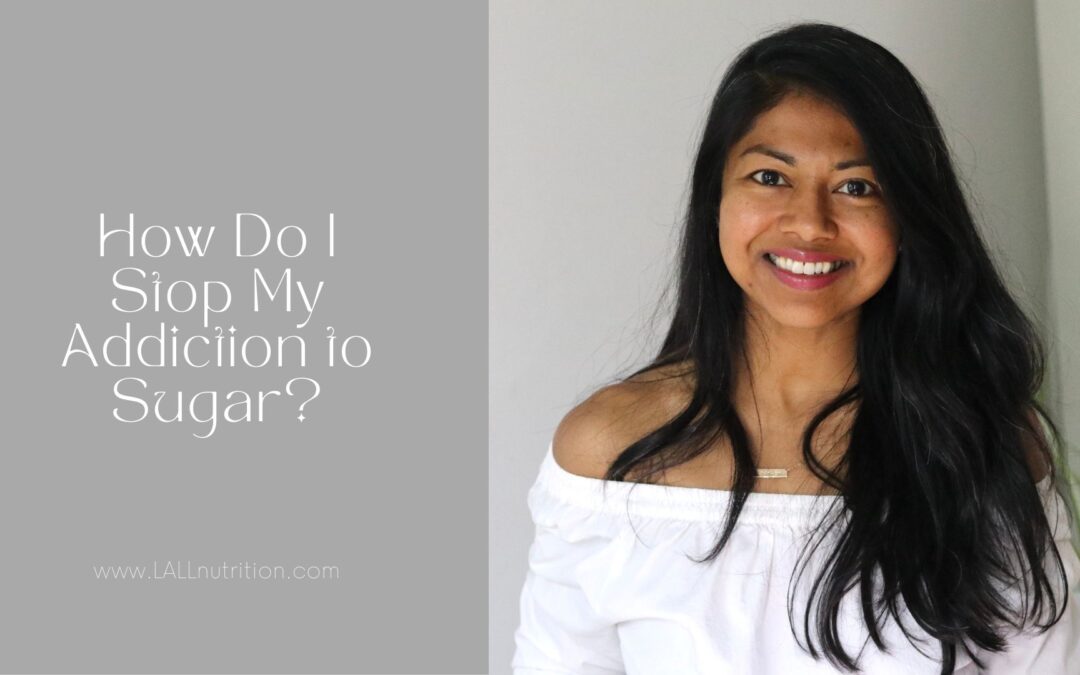Hello love,
Today I wanted to answer a question that I got that is probably a really typical question that I get from women “how do I stop my addiction to sugar?”
This is a question that I get a lot because when we emotionally eat and we feel we have this addiction to foods or certain foods, we just want to get rid of that addiction. This becomes the blanket question because we don’t know there are different layers to this coping mechanism.
Emotional eating is when we use food to soothe ourselves from any discomfort, uncomfortable emotions or distress. We go towards food to soothe us and to numb out.
Coping with food
This coping mechanism has been repeated so many times, it’s automatic. Now we impulsively go to these foods. It is an addictive pattern and it’s similar to other addictive patterns like using social media, drinking or over exercising. When we feel out of control and like it’s a craving vs. desire we are using things in an addictive way.
Like all addictive patterns, it’s serving a purpose. It’s helping us “deal” with our lives.
On the surface we see we are addicted to certain foods, but what’s under that are so many layers. Like I mentioned, emotional eating is this addictive pattern. It usually has its roots in childhood. So we need to understand what’s really going on here.
Whenever we have an addictive pattern to something, it’s giving us a payoff. When we emotionally eat and we use food, we’re getting some kind of soothing. We’re not having to feel the discomfort of what’s going on. For us, it’s giving us a little bit of relief. But as you know, that relief is not enough for the consequence of those actions.
Consequences of this pattern
The consequences of this pattern that I’ve seen for clients and even for myself is feeling out of control. Choosing foods that are not going to soothe your body long term or add to your health. When we emotionally eat we are going towards processed foods, eating copious amounts of foods when we’re not truly hungry. This impacts our health in terms of digestive issues, mood issues, our self confidence, inflammatory conditions, acne, weight gain and the list goes on.
When I was going through my emotional eating, some of the symptoms I had along with my emotional eating was low mood, digestive issues, acne, terrible PMS, low energy, weight issues.
As I started to heal my emotional eating, I could take care of my health in a better way and connect the dots.
So this question “I have this addictive pattern to sugar” we have to look at this in layers because now we know this is a coping mechanism and it’s an addiction. It doesn’t mean let’s just take the food away, let’s just take the substance away.
Transferring this pattern
What that’s doing is just opening up this gateway for us to transfer this. I’ve had clients that have smoked most of their lives. All of a sudden they stop and now they’re an emotional eater. So we just transfer our addictions if we don’t get to the true root. For food, we can’t just take food out of our life.
Food is legal. It’s everywhere. And whether we take it out of our house, we’re going to still see it at someone else’s house. We can’t control it. And we’re not meant to control it.
We’re meant to figure out what’s going on for us. This is why emotional eating is a multilayered and we need to work through it in a specific way.
There is a few reasons we’re emotionally eating. Sometimes it’s not just about the emotions we’re feeling, it’s about how we are nourishing our body. In the end, the way we nourish our body is also impacting us on these deeper levels as well.
But the way I like to frame it and the process I use with clients, is to move through three key areas and to evaluate where are we at.
Relationship to Food
In terms of our relationship to food, so now we have this unhealthy relationship to food where we almost feel we have an addiction to it. We need to look at how we relate to food. Are we nourishing our bodies most of the time? Do we have a nourishing relationship to food?
Or is it more about restriction and cutting this food out and that food out? When we feel this compulsion towards food and we crave it, there’s more going on. And the first layer we need to look at is how we’re nourishing ourselves. So are we in this diet mentality? Do we constantly second guess our foods?
Do we obsess about our foods? Are we spiralling? If I were to look at the way you’re eating throughout the day, is it in a nourishing way? Do you feel good after your meals? Do you feel satisfied? Are you eating enough?
Of course, I’m a holistic nutritionist, and I use specific strategies inside of the Emotional Eating Evolution Program to discern and determine if you’re eating enough throughout the day, if you’re nourishing your body, if that food is digesting and actually giving you the nutrients it needs.
Then we can start seeing where you’re using food to soothe and your triggers. So when you’re nourishing yourself well, it’s going to be easier to discern true from emotional hunger.
When we’re emotional eaters and we have this addictive pattern to food, we are out of control with food.
So that’s the first layer we need to look at to help with this addiction. We have to see what needs are not being met in terms of truly nourishing our body and to catch those triggers that might be triggering this.
Relating to Your Body
The second area is around our body. Is the worth of our body or the value of who we are is tied into how we look or how we think we should look? Are we punishing ourselves at the gym or pushing ourselves at work? Are we constantly busy and putting ourselves into a stressful state? Maybe we’re not giving our bodies enough rest or following its rhythms or honouring it. We keep pushing past it.
This will trigger a stress response in the body. That will push us into emotionally eating because when this discomfort comes up, we go towards food.
When Triggered
The third layer is really about what do we do when we’re triggered. Emotional eating is a coping mechanism. What I see with clients is this goes back to childhood where we had unmet needs or unresolved situations or events happen to us.
This is a trauma. Trauma doesn’t have to be those big things we think – it’s on a spectrum from small to big. Small trauma can look like being ignored, told we’re emotional too sensitive, it’s not a big deal or being dismissed, etc.
This can be seen as something smaller because it’s just a small event versus an accident or sort of the bigger traumas we think of. But they’re all on a spectrum and they impact us. When we’re very young and developing, we’re very sensitive and these things seem much bigger.
We developmentally need our parents or caregivers there to help us navigate these emotions and to move through the discomfort because our emotions are giving us information.
But if that wasn’t modelled or shown to us, which most likely wasn’t. If we weren’t modelled this, then we’re left to figure out how to deal with our emotions. This is where coping mechanisms come in because we feel this discomfort a we don’t know what to do. We don’t have guidance, we don’t have a way forward.
We need to go back, integrate and process what happened so that we can create a healthy way forward to meet our true needs. We’ve been trying to meet our needs with food and that’s a poor substitute.
This is how we start dissolving that addiction to these foods.
A coping mechanism is a poor substitute for what we needed.
For us, it’s not about simply removing a food from your life, it’s about navigating it because when you get in touch with yourself on all of these levels in terms of food, your body and your emotions, that food will not soothe that discomfort, it won’t be able to be a Band Aid anymore. You’ll navigate your life and be able to create that healthy relationship to food, your body and your emotions and not have this craving because your true needs will have been met. This leads to peace and ease and confidence in your body, around food, and in your life. So if what I’ve shared with you today is resonating, let me know. If you’d like to dive deeper.
Invitation
The Emotional Eating Evolution Program is a step by step methodology on how to resolve your emotional eating from the root so you can finally feel confident in your body and around food. It has built in support, guidance, coaching, in depth somatic meditations to help you resolve this pattern. This is a transformational process to resolve your emotional eating. Find out more about it HERE.
To a healthy relationship to food,
Michelle
Certified Holistic Nutritionist Specializing in Emotional Eating


